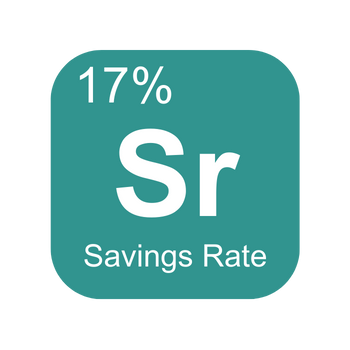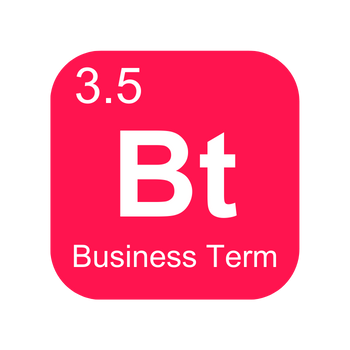Defining the Elements
At Oakleigh, we use an app called Elements to show a quick snapshot of your financial health and track specific key metrics over time. This is very similar to how a doctor might track your vital signs to understand your physical health and quickly diagnose specific issues. Of course, there’s a story behind all of these numbers and we would dive much deeper for a full financial planning engagement. However, you might be surprised by how many important issues can be uncovered and addressed from these high-level metrics alone.
What follows is a high-level overview of each of the Elements, including how to calculate them and the important questions each can answer. The more familiar you are with each of these elements, the more you can see how each of them connects to the others in powerful ways (for better or for ill).
FINANCIAL INDEPENDENCE:
Am I ready to make work optional?
Total Term
Total Term equals your net worth divided by your annual living expenses (including debt payments). It’s a crude answer to the question, how long can you live off of your assets if you stopped earning today? Your target for Tt is unique to your situation, and as a financial advisor, one of my main objectives is to help you grow your net worth at an appropriate rate to achieve your goals. How much wealth do you need to make work optional?
CASH FLOW:
Am I using my income wisely?
The next four elements are all expressed as a percentage of your annual gross income. They should always add up to 100% since these are the only buckets where your money can possibly flow.
Savings Rate
There are only two ways to grow your net worth: savings and investment returns, and the former is the only one you have direct control over. Are you saving enough to reach your financial goals? Are you saving in the right places?
Burn Rate
Am I spending an appropriate amount? Do I even know what I’m spending? Burn rate is often the most difficult number to pin down, and unless you utilize a tracking app (Mint or SimpliFi) or a spreadsheet, you don't know what you’re actually spending. We often end up approximating spending by process of elimination (Income - savings - debt - taxes = burn rate), but there are great benefits to understanding your spending at a more granular level. Budgeting is optional, but tracking is necessary.
Debt Rate
Do I have too much or too little debt? Is any debt good? We’re all aware of the dangers of carrying too much debt. Principal and interest payments can crowd out your ability to save or fund current living expenses. However, debt can also be an important tool for reaching your goals, and if managed well, can actually increase your ability to grow your net worth. How you manage debt is just as important as how you invest your savings and it can be just as fraught with emotional as well as technical considerations. Should I invest or pay off debt?
Tax Rate
Is my tax liability appropriate for my circumstances? Of all the cash flow items, we tend to have the least amount of control over what we pay in taxes, but there are still a lot of opportunities to be smart about taxes. Taking advantage of the various features of the tax code and carrying out a longer-term tax strategy can make a significant difference in your net worth.
ASSET MIX
Do I have the right mix of assets?
Your Total Term score (discussed above) gives a high-level indication of your retirement readiness, but the following Elements further break down your net worth into various categories, each having important attributes and caveats.
Liquid Term
Do I have enough liquidity to meet my needs? Your Lt score totals up your liquid assets (checking, savings, CDs, money market, taxable brokerage accounts) as a multiple of your annual spending. Your Lt score represents your emergency fund (your ability to withstand a shock) but it also represents flexibility. This is money you can access without penalty for near-term goals big or small, supporting a family member, investing in your business, or retiring early.
Qualified Term
Am I maximizing benefits from available retirement accounts? Saving and investing in tax-advantaged retirement and education accounts can have a significant impact on the taxes you pay now and in the future. Depending on your current income level and expectations for future earnings, your liquidity needs, and your goals, there are lots of ways to benefit from managing the right mix of qualified accounts. In exchange for the tax advantages, there are certain restrictions on how and when you can access these funds (but also strategies for minimizing their impact, should you need to access them sooner).
Real Estate Term
Your home is a place to live, but it's probably also among the largest assets you own. Perhaps you also own a second home or investment property that generates income. Rt represents the equity value of your owned real estate (i.e. market value minus mortgage debt) in terms of your annual spending. If your net worth is overly concentrated in real estate (a.k.a. “House poor”), you may have difficulty accessing those dollars to fund your goals without major changes to your living situation, transaction costs, and lead time.
Business Term
Do I have too much or too little net worth concentrated in my business(es)? Like real estate, your business may be an outsized portion of your net worth, but it may also be your major source of income, and the ultimate value of your business is likely even more difficult to predict and realize. If you are a business owner, there’s an ongoing push-pull between investing in your business and taking cash out of the business. Your business may have been the source of your wealth, but can it survive without you? Being a business owner exposes you to additional risks as well as significant opportunities for wealth creation, satisfaction, and impact.
RISK
Am I taking the right amount of risk?
Equity Rate
Am I taking too much or too little investment risk? Your equity rate (percentage of investible assets invested in stock) is a crude measure of how much investment risk you’re taking. Historically stocks have offered the highest long-run returns, but they also have considerably higher volatility or potential for losses in the short run if the markets or economy falter. The appropriate amount of investment risk for you is a function of your risk tolerance (your ability to sleep at night), and risk capacity (how much risk you’re financially able to accept). Check out our article, Risk Tolerance & Risk Capacity, and take our free questionnaire to start the conversation on the appropriate level of investment risk for you.
Insurance Rate
If you have people in your life who are financially dependent upon you, then you need insurance to protect them. Like investment risk, the right amount and type of life insurance and disability policies include both subjective and objective considerations. Like the investment business, there’s no shortage of hacks and less-than-honorable insurance salesmen ready to sell you a complicated product you may not need for a price that’s too high. And yet, insurance remains a crucial part of a solid financial plan.
Estate Plan
Are you prepared to answer end-of-life questions? Having an estate plan is important at almost any age and it should be revisited every couple of years or when situations change. I get it, these are not fun topics to dwell on, but I’ve seen too many cases where families are thrown into chaos, financial difficulty, disagreement, or indecision without a plan. For most folks, this will take the form of three key documents:
A will can help make sure your loved ones are taken care of and your belongings go where you want them to
An advanced medical directive (aka living will) ensures your wishes are known and are carried out with regard to difficult end-of-life decisions
A durable limited power of attorney empowers a trusted person to manage your financial, legal, and business affairs on your behalf if you cannot.
The more familiarity you have with these twelve elements the more you start to see their interactions with each other, and the impact they have on your financial life and its many convergences with your lived experiences and relationships. It’s important to remember that you are not the sum of your financial metrics nor are you defined by the contours of your net worth; however, if you’re open to it, it’s amazing how quickly a discussion about ostensibly sterile financial matters can lead to deeper discussions about personal values and limitations, social and emotional issues, and bigger questions around the purpose of life itself.
How financially healthy are you?
Get started with our easy-to-use mobile app to create your own scorecard, and we’ll follow up with a free assessment by email














